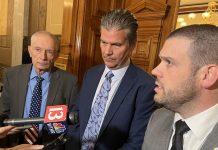Commentary: Assange And The Reality Of Truth
By John Krull
TheStatehouseFile.comÂ
INDIANAPOLIS – Truth is messy.
It often makes people uncomfortable.
It neither knows nor honors any political party.
And it often comes from unsavory sources.
Perhaps no other living figure illustrates this fundamental reality more than Julian Assange.
The WikiLeaks founder held prisoner now in Great Britain isn’t a likable guy.
He has been accused, credibly, of rape and sexual molestation in Sweden. He seems to have used the political asylum he sought from Ecuador to skillfully and successfully run out the statute-of-limitations clock to avoid facing most of those charges.
He also has a knack for mixing smug moralizing and base hypocrisy into a kind of stomach-churning stew. He claims to be a servant of transparency – of allowing people access to all information – but he hides the methods he uses to gather information.
And, without question, he has lied about how and from whom he got some of that information.
Assange’s eel-like ethical slipperiness has made it easier for different people to embrace him at different times.
Liberals and Democrats tended to like him when WikiLeaks exposed many of the lies and distortions that led America into the Persian Gulf War. Conservatives and Republicans cheered him on when WikiLeaks released many of the emails and internal correspondence from Democrat Hillary Clinton’s 2016 presidential campaign.
There’s nothing new about this.
One thing journalists and other lovers of free speech learn quickly is that a disquieting number of First Amendment victories are won in defense of other disreputable people or causes. Protecting the Klan’s right to march also preserves the rights of civil rights advocates to demonstrate. Mounting a defense for the National Enquirer’s often-scurrilous speculations guarantees that The New York Times, The Wall Street Journal and other papers of weight can do investigations that matter.
But the ambivalence Assange inspires comes from a human impulse more basic even than the desire to speak freely.
We all find it easier to embrace the truth when it conforms to our beliefs or interests – and to reject it, as well the messengers who bring it, when it doesn’t.
We’re seeing that dynamic play out now.
Donald Trump lauded WikiLeaks and Assange when he was a candidate for president. He urged Assange and his team to release as much dirt on Hillary Clinton as they could find.
Now, though, the president says he doesn’t even know WikiLeaks.
Trump’s amnesia may stem from the fact that Assange likely soon will be testifying about where and how – possibly from Russia and Russian operatives – he got the Clinton emails and correspondence. That undoubtedly will fuel Democrats’ desire for the full report from Special Counsel Robert Mueller.
But Trump isn’t the only one with reason to feel uneasy.
Assange doesn’t appear to be the sort to fall on his sword.
In part, this is because of what he sees as his mission. He revels in revealing rather than keeping secrets.
There also, though, is something in the nature of the man. He has had many opportunities over the years to make himself a martyr for his beliefs and face prison time.
He’s fought or fled every time.
Now that he’s captured and facing a long stay behind bars, the bet here is that he will trade. The only thing he has to offer is the thing that made him famous – information.
In this case, it will be information about how and where he gathered information.
The truth will come out.
When it does, it will be messy.
It will make people – including some people in power – uncomfortable.
It won’t honor any political party.
And, yes, it will come from an unsavory source.
John Krull is director of Franklin College’s Pulliam School of Journalism, host of “No Limits†WFYI 90.1 Indianapolis and publisher of TheStatehouseFile.com, a news website powered by Franklin College journalism students.






